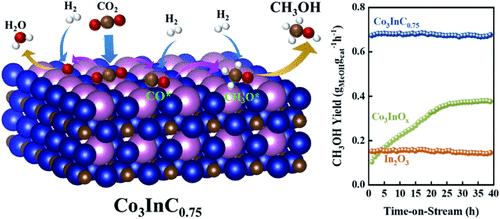Unveiling the Role of Co3InC0.75 Bimetallic Carbide in CO2 Hydrogenation to Methanol
IF 13.1
1区 化学
Q1 CHEMISTRY, PHYSICAL
引用次数: 0
Abstract
Bimetallic Co/In2O3 catalysts are known for their promising performance in the hydrogenation of CO2 to methanol, often undergoing structural transformation during a prolonged induction period. Co3InC0.75 is frequently observed after this process, yet its catalytic role has remained elusive due to the lack of phase-pure materials and mechanistic clarity. Herein, we report the synthesis of highly crystalline, phase-pure Co3InC0.75 via a one-step gas-phase carburization method. Catalytic tests reveal that Co3InC0.75 acts as an active phase for CO2 selective hydrogenation, achieving a methanol space-time yield of 0.69 gMeOH gcat–1 h–1with a selectivity of 70.1% at 280 °C, 5 MPa, H2/CO2 ratio of 3:1, and a gas hourly space velocity of 24,000 cmSTP3 gcat–1 h–1, and remains stable over 100 h of continuous operation. In situ characterizations and theoretical studies confirm that the carbide surface promotes direct CO2 dissociation and sequential hydrogenation via an RWGS-mediated pathway. This work identifies Co3InC0.75 as a previously overlooked active phase and expands the design landscape for carbide-based CO2 hydrogenation catalysts.

揭示Co3InC0.75双金属碳化物在CO2加氢制甲醇中的作用
双金属Co/In2O3催化剂在CO2加氢制甲醇中具有良好的性能,通常在较长的诱导期内发生结构转变。在此过程中经常观察到Co3InC0.75,但由于缺乏相纯材料和机制清晰,其催化作用仍然难以捉摸。在此,我们报告了通过一步气相渗碳方法合成高结晶,相纯的Co3InC0.75。催化实验表明,Co3InC0.75作为CO2选择性加氢的活性相,在280℃、5 MPa、H2/CO2比为3:1、气体每小时空速为24000 cmSTP3 gcat-1 h - 1的条件下,甲醇空时产率为0.69 gMeOH gcat-1 h - 1,选择性为70.1%,连续运行100 h以上保持稳定。原位表征和理论研究证实,碳化物表面通过rwgs介导的途径促进了二氧化碳的直接解离和顺序氢化。这项工作确定了Co3InC0.75是一个以前被忽视的活性相,并扩大了基于碳化物的CO2加氢催化剂的设计范围。
本文章由计算机程序翻译,如有差异,请以英文原文为准。
求助全文
约1分钟内获得全文
求助全文
来源期刊

ACS Catalysis
CHEMISTRY, PHYSICAL-
CiteScore
20.80
自引率
6.20%
发文量
1253
审稿时长
1.5 months
期刊介绍:
ACS Catalysis is an esteemed journal that publishes original research in the fields of heterogeneous catalysis, molecular catalysis, and biocatalysis. It offers broad coverage across diverse areas such as life sciences, organometallics and synthesis, photochemistry and electrochemistry, drug discovery and synthesis, materials science, environmental protection, polymer discovery and synthesis, and energy and fuels.
The scope of the journal is to showcase innovative work in various aspects of catalysis. This includes new reactions and novel synthetic approaches utilizing known catalysts, the discovery or modification of new catalysts, elucidation of catalytic mechanisms through cutting-edge investigations, practical enhancements of existing processes, as well as conceptual advances in the field. Contributions to ACS Catalysis can encompass both experimental and theoretical research focused on catalytic molecules, macromolecules, and materials that exhibit catalytic turnover.
 求助内容:
求助内容: 应助结果提醒方式:
应助结果提醒方式:


